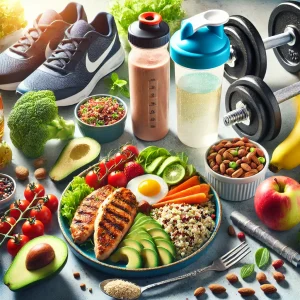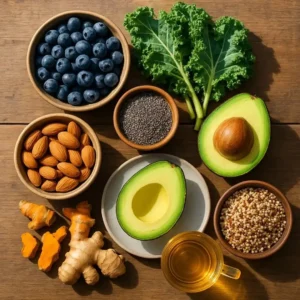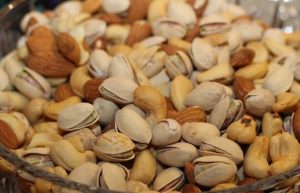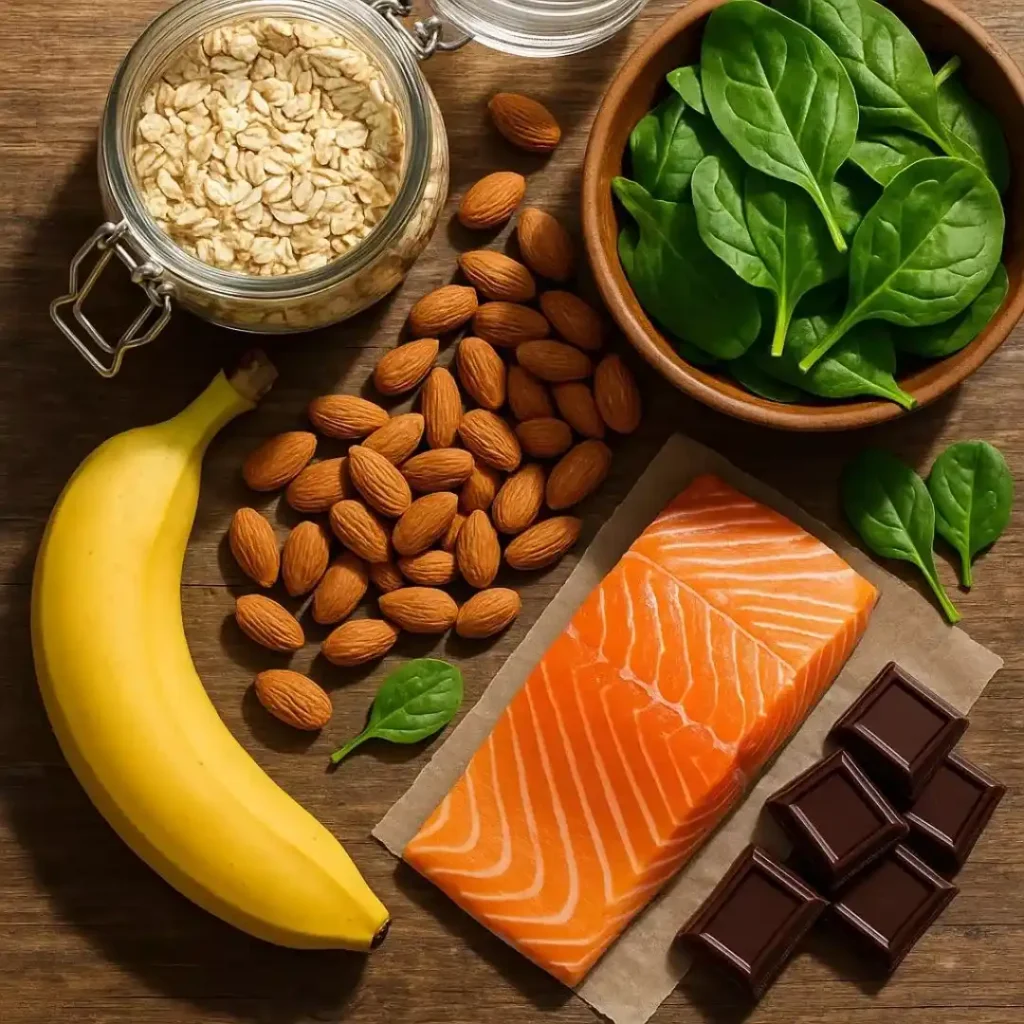
Do you ever feel like you’re running on empty? That 3 PM crash hits hard, your focus fades, and you find yourself reaching for a sugary snack or yet another cup of coffee just to make it through the afternoon. I’ve been there too. In fact, for years, I thought that constant, dragging fatigue was just a normal part of adult life. However, I discovered a powerful truth: the secret to unwavering energy isn’t found in a quick fix; it’s on your plate.
This realization completely transformed my days. Therefore, I’ve compiled this definitive guide to the top 10 energy foods. This list isn’t based on trends; instead, it’s rooted in nutritional science and is designed to provide your body with sustained, clean-burning fuel. Consequently, you can say goodbye to energy crashes and hello to vibrant, all-day stamina.
What Truly Makes a Food an Energy Powerhouse?
Before we dive into the list, it’s crucial to understand what separates true energy foods from mere quick fixes. Many people, for instance, confuse a sugar rush with genuine energy. On the other hand, sustainable energy comes from foods that stabilize your blood sugar and provide a slow, steady release of fuel.
The Core Components of Lasting Energy
Firstly, complex carbohydrates are your body’s preferred source of fuel. Unlike simple carbs, they digest slowly. In addition, dietary fiber plays a key role by further slowing down digestion, which prevents those dreaded spikes and crashes.
Secondly, lean protein is essential. It not only helps build and repair tissue but also promotes a feeling of fullness. Moreover, it works to stabilize blood sugar levels, ensuring a steady supply of energy.
Finally, we have healthy fats and key micronutrients. Foods rich in healthy fats provide a dense, long-lasting energy source. Furthermore, specific minerals like iron and magnesium are critical for your body’s energy production processes. For example, iron helps transport oxygen to your cells.

A Simple Guide to Energy Nutrients
The following table breaks down the key players in your fight against fatigue.
| Nutrient | Its Role in Your Energy Levels | Top Energy Foods |
|---|---|---|
| Complex Carbs | Provides a steady, slow release of glucose into your bloodstream. | Oats, Quinoa, Sweet Potatoes |
| Iron | Carries oxygen in your blood; low levels directly cause fatigue. | Spinach, Lentils, Lean Red Meat |
| B-Vitamins | Acts as a key helper in converting your food into usable energy. | Eggs, Almonds, Legumes |
| Healthy Fats & Protein | Offers long-lasting energy and keeps blood sugar stable. | Salmon, Greek Yogurt, Chia Seeds |
The Definitive List of the Top 10 Energy Foods
Now, let’s explore the elite group of fatigue-fighting foods. These natural energy foods are proven to enhance your stamina and focus.
1. Oats: The Breakfast of Champions
Oats are a premier energy food because they are packed with beta-glucan, a soluble fiber that forms a gel in your gut. This gel slows down digestion, leading to a gradual release of glucose into your blood. Therefore, a bowl of oatmeal for breakfast can power you through your entire morning without a crash, thanks to its perfect mix of complex carbohydrates and fiber.
2. Quinoa: The Complete Protein Grain
Unlike most plant-based foods, quinoa is a complete protein, meaning it contains all nine essential amino acids. In addition to its protein content, it’s also a fantastic source of complex carbohydrates and magnesium. This combination makes it one of the best energy foods for sustained physical and mental endurance, supporting muscle repair and steady fuel release simultaneously.
3. Lentils: The Iron-Rich Powerhouse
If you often feel drained, low iron could be a culprit. Lentils are a triple threat against fatigue: they are loaded with iron, dietary fiber, and plant-based protein. This trio works together to boost your oxygen transport, stabilize your energy levels, and keep you feeling full and satisfied for hours. They are a cornerstone of any energy-focused diet.
4. Greek Yogurt: The Protein-Packed Snack
Greek yogurt is strained, resulting in a product with double the protein of regular yogurt. This high protein content is vital for stabilizing blood sugar, which prevents mid-morning or afternoon slumps. Furthermore, its probiotics support gut health, which is increasingly linked to improved overall energy levels and a stronger immune system.
5. Bananas: Nature’s Perfect Power Bar
Bananas offer the ideal portable energy combination. They provide quick-acting natural sugars like glucose, fructose, and sucrose for an immediate boost. However, they also contain essential fiber and potassium. The fiber moderates the sugar release, while the potassium helps maintain proper nerve and muscle function, making it a perfect pre-workout snack.
6. Sweet Potatoes: The Complex Carb King
When you need long-lasting fuel, sweet potatoes are your go-to source. They are loaded with complex carbohydrates and a significant amount of fiber, which ensures a slow, steady climb in energy rather than a sharp spike. Additionally, they are rich in vitamin A and manganese, both of which play supporting roles in your body’s energy metabolism.
7. Almonds: The Crunchy Energy Reservoir
Almonds are a nutrient-dense snack that delivers a powerful combo of healthy fats, protein, and magnesium. Magnesium is a mineral directly involved in converting sugar into energy within your cells. Therefore, a small handful of almonds can fend off hunger and provide a sustained energy reserve, making them excellent for beating the afternoon slump.
8. Spinach: The Leafy Green Energizer
Popeye was onto something! Spinach is a phenomenal source of iron, which is essential for producing hemoglobin to carry oxygen in your blood. Without sufficient oxygen, your cells can’t produce energy efficiently. It’s also rich in fatigue-fighting magnesium. Adding a handful to salads, smoothies, or scrambles is an easy energy upgrade.
9. Salmon: The Omega-3 Brain Booster
Fatty fish like salmon are rich in Omega-3 fatty acids, which are renowned for reducing inflammation, a known contributor to fatigue. Moreover, these healthy fats are crucial for brain health, directly combating mental fog and supporting cognitive function. The high-quality protein in salmon also aids in sustained energy and satiety.
10. Dark Chocolate: The Guilt-Free Indulgence
Yes, you read that correctly! Dark chocolate (70% cocoa or higher) earns its spot as a top energy food. It contains a small amount of caffeine and a compound called theobromine for a mild, focused mental boost without the jitters. Furthermore, its flavonoids improve blood flow to the brain, enhancing cognitive function and alertness. A square or two is all you need.
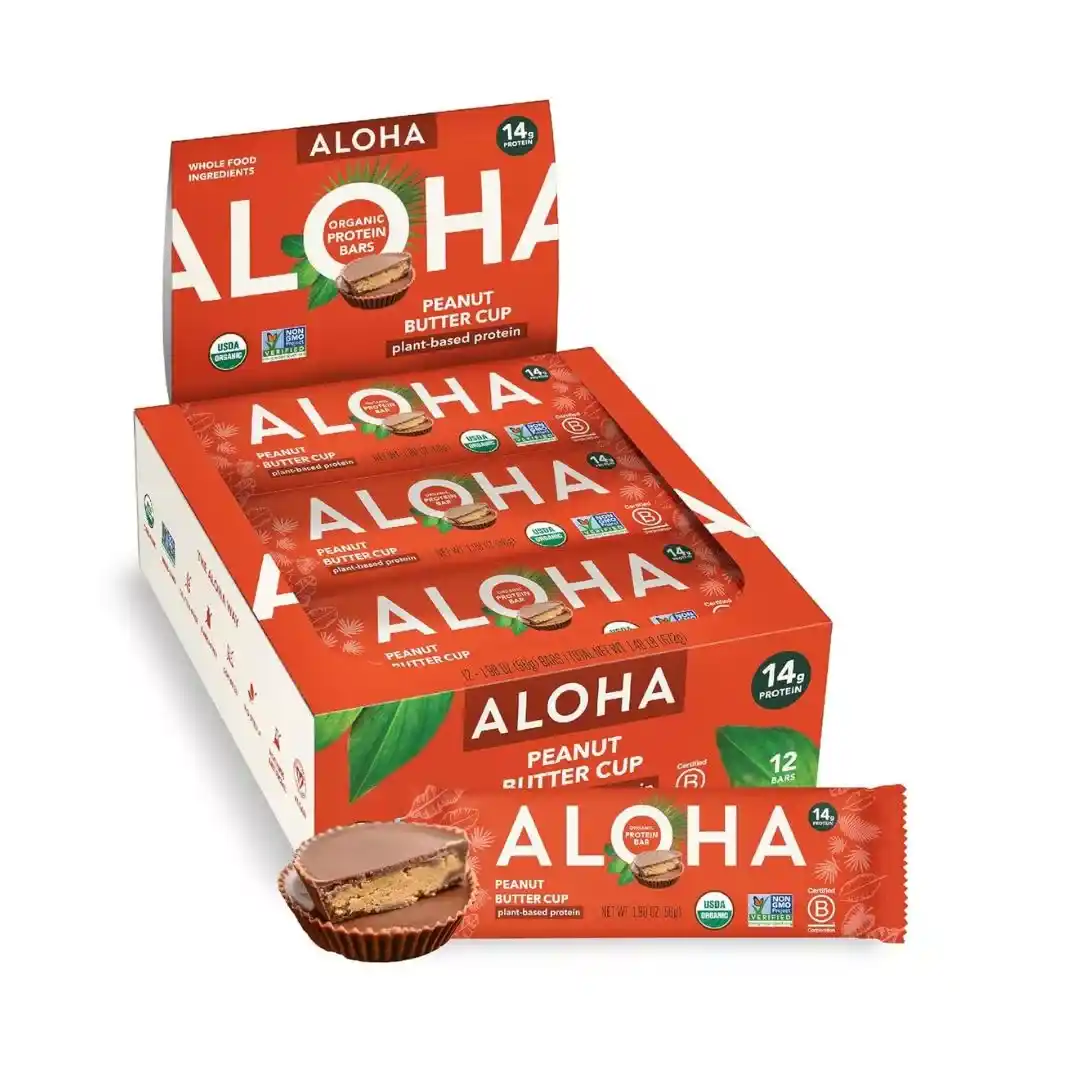
Fuel your day the clean way! Enjoy the rich taste of ALOHA Organic Plant Based Protein Bars – Peanut Butter Cup. Packed with 14g of organic plant protein, these vegan, gluten-free, and low-sugar bars are the perfect snack to power your workouts or busy days. No stevia, no erythritol — just smooth, satisfying goodness in every bite!
How to Seamlessly Integrate Energy Foods Into Your Day
Knowing which energy foods to eat is one thing; however, knowing how to eat them is another. Here is your practical action plan for incorporating these energy boosters into your daily routine.
Building Your Power Plate
A simple strategy for every meal is to follow the “Power Plate” formula. Aim to fill half your plate with non-starchy vegetables, a quarter with a lean protein source, and the final quarter with a complex carbohydrate from this list. For instance, a lunch of grilled salmon (protein), quinoa (complex carb), and a large spinach salad (vegetables) is a perfect example.
Smart Snacking for Steady Energy
Smart snacking is essential for preventing energy dips between meals. Instead of reaching for a candy bar, try combining a complex carb with a little protein or healthy fat. An apple with a tablespoon of almond butter or a small cup of Greek yogurt with berries are excellent choices that provide lasting energy.
Your One-Day Energy-Boosting Meal Plan
- Breakfast: Overnight oats made with rolled oats, chia seeds, and topped with banana slices.
- Lunch: A large salad with a base of spinach and mixed greens, topped with cooked lentils, quinoa, and a light vinaigrette.
- Snack: A small handful of raw almonds and a square of dark chocolate (70% cocoa or higher).
- Dinner: A baked sweet potato topped with black beans, a dollop of Greek yogurt, and a side of steamed broccoli.
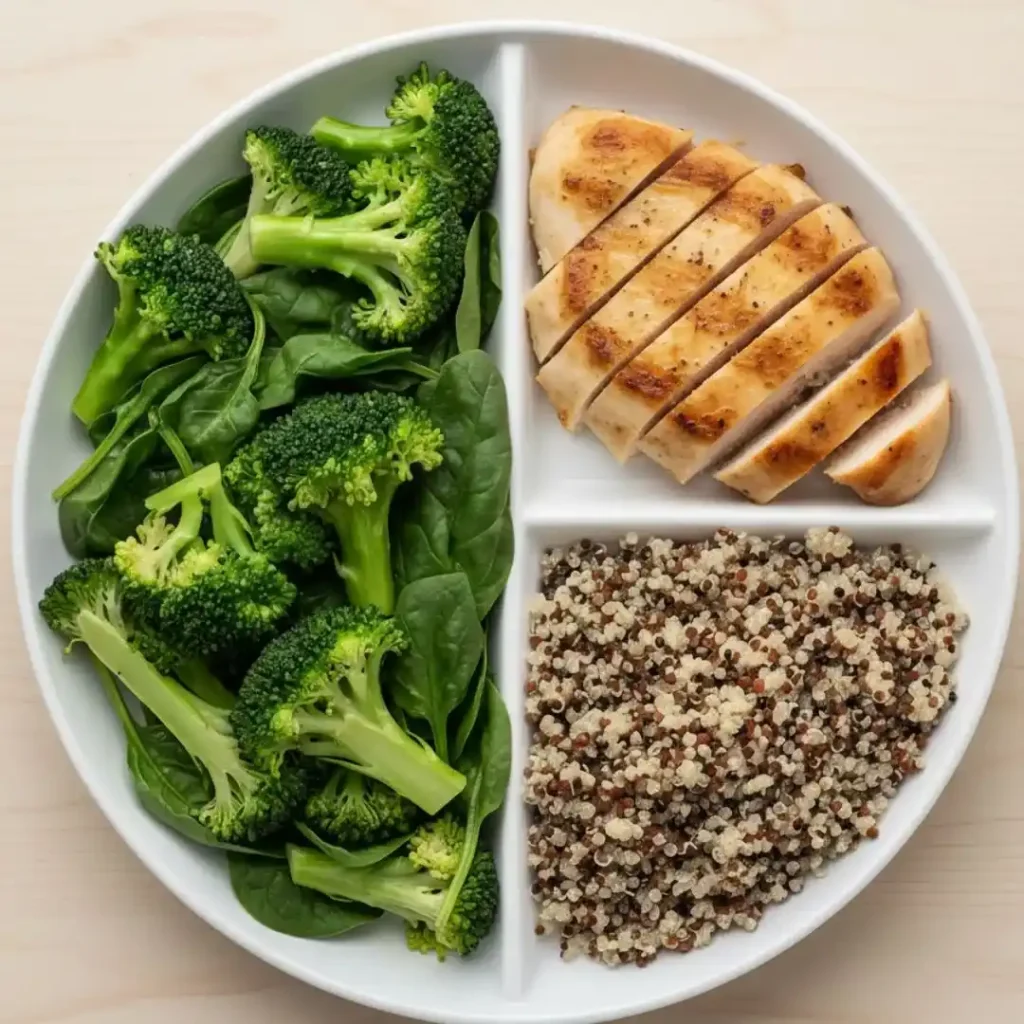
Energy Myths Busted: What to Avoid for Sustained Vitality
Many common beliefs about energy foods are misleading. Let’s clear up some of the biggest misconceptions that could be sabotaging your stamina.
Myth 1: Sugar and Coffee are the Best Quick Fixes
While a sugary treat or a strong coffee can provide an immediate jolt, this effect is short-lived. Consequently, your body responds with a surge of insulin, leading to an inevitable energy crash a short time later. This cycle often leaves you more tired than you were initially.
Myth 2: All Calories Provide the Same Energy
This is a fundamental misunderstanding of nutrition. One hundred calories from a soda will not fuel your body in the same way as one hundred calories from almonds. The almonds provide fiber, protein, and healthy fats, leading to a sustained energy release, while the soda causes a rapid spike and crash.
Myth 3: Skipping Meals Saves Calories and Energy
This strategy almost always backfires. When you skip a meal, your blood sugar drops, causing fatigue and irritability. Later, you are far more likely to overeat or choose unhealthy, high-calorie foods because you are ravenous. Therefore, eating regular, balanced meals and snacks is the true key to managing both energy and weight.
FAQs About Energy Foods
What food gives the most energy?
For sustained energy, complex carbohydrates paired with protein and healthy fats are best. Top choices in energy foods include oatmeal, sweet potatoes, brown rice, lentils, and fatty fish like salmon. These foods provide a slow release of glucose into the bloodstream, preventing energy crashes and keeping you fueled for hours.
What foods help with fatigue?
Energy foods rich in iron, B vitamins, and magnesium combat fatigue. Focus on:
Spinach & Lentils: For iron to prevent anemia.
Nuts & Seeds: For magnesium, crucial for energy production.
Eggs & Yogurt: For B vitamins that convert food into energy.
Berries & Citrus: Vitamin C helps iron absorption and fights oxidative stress.
How do I boost my energy levels?
Boost energy by staying hydrated, eating small, balanced meals every 3-4 hours, and prioritizing sleep. Limit sugary snacks and refined carbs that cause energy spikes and crashes. Incorporate regular physical activity to improve circulation and stamina. Managing stress through mindfulness can also prevent mental fatigue.
What gives you quick energy?
For a rapid (but short-lived) energy boost, consume simple carbohydrates like a piece of fruit, a handful of dried fruit, or a rice cake. The natural sugars are quickly absorbed. Pairing it with a small amount of protein (like a few nuts) can help stabilize the energy release and prevent a sharp crash. Caffeine also provides a quick, temporary stimulant effect.
Your Personal Blueprint for Unstoppable Energy
In conclusion, transforming your energy levels is entirely within your reach. By shifting your focus from short-term stimulants to these powerful, nutrient-dense whole foods, you are building a foundation for lasting vitality.
Therefore, I challenge you to start small. Pick two or three energy foods from this list and make a conscious effort to include them in your meals this week. Pay close attention to how you feel. Notice the improved focus, the absence of the afternoon slump, and the new, steady rhythm of your days. Your body is designed to feel vibrant and alive—it’s simply waiting for the right fuel.
What is your go-to snack for a quick energy boost? Share your favorites in the comments below!
Affiliate Disclaimer: This post may contain affiliate links. This means I may earn a small commission if you make a purchase through these links, at no extra cost to you. I only recommend products and services I truly believe in and that I believe will add value for my readers. Your support helps keep this blog running. Thank you!


